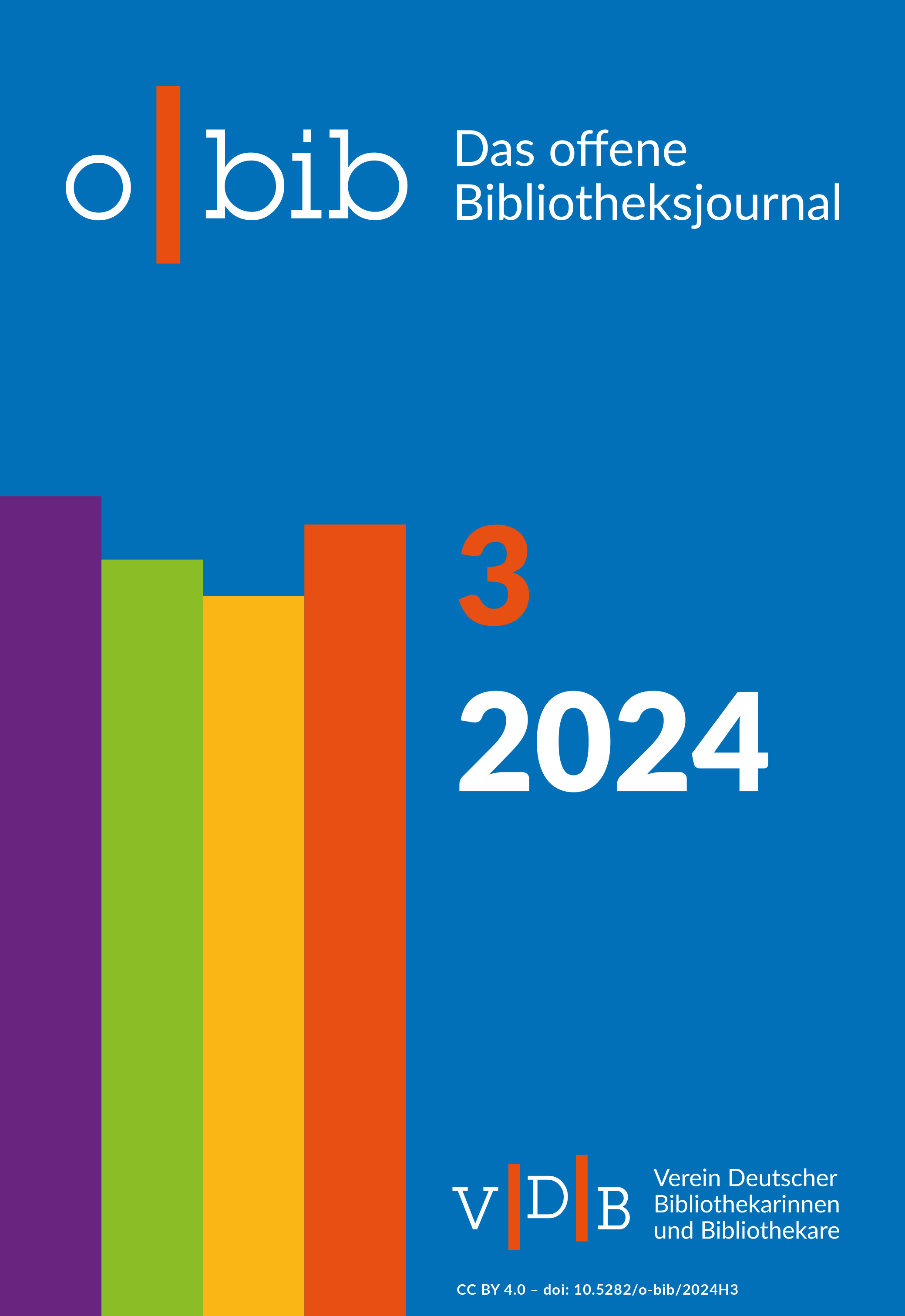Virtueller Campus
Digitale Plattform für Online-Lehre und die Förderung digitaler Kompetenz
DOI:
https://doi.org/10.5282/o-bib/6042Schlagwörter:
Digitale Kompetenz, IKT, Virtueller Campus, Evaluation, SAGEAbstract
Die Förderung digitaler Kompetenz im Rahmen des Studiums wird immer wichtiger. Um die technologiegestützte und digitale Lehre zu stärken und die Entwicklung digitaler Kompetenz der Studierenden zu fördern, wurde an der Katholischen Hochschule für Sozialwesen Berlin (KHSB) die E-Learning-Plattform Virtueller Campus (VC) entwickelt. Die hier vorgestellten Ergebnisse der Studie zeigen, dass die Studierenden neue Funktionen im VC positiv evaluieren. Die Evaluation von VC-Funktionen hängt mit dem Wissen über die Funktionen positiv zusammen. Durch den Einsatz des VC wurden bei den Studierenden die digitale Kommunikation, die Zusammenarbeit und das Erstellen von digitalen Inhalten (DigCom2.2) signifikant verbessert.
Literaturhinweise
Al-Nuaimi, Maryam N.; Al-Emran, Mostafa: Learning Management Systems and Technology Acceptance Models. A Systematic Review, in: Education and Information Technologies 26 (5), 2021, S. 5499–5533, https://doi.org/10.1007/s10639-021-10513-3.
Bejaković, Predrag; Mrnjavac, Željko: The Importance of Digital Literacy on the Labour Market, in: Employee Relations. The International Journal 42 (4), 2020, S. 921–932, https://doi.org/10.1108/ER-07-2019-0274.
Bonfield, Christopher Alan; Salter, Marie; Longmuir, Alan u. a.: Transformation or Evolution? Education 4.0, Teaching and Learning in the Digital Age, in: Higher Education Pedagogies 5 (1), 2020, S. 223–246, https://doi.org/10.1080/23752696.2020.1816847.
Chattaraj, Dishari; Vijayaraghavan, Arya Parakkate: The Mobility Paradigm in Higher Education. A Phenomenological Study on the Shift in Learning Space, in: Smart Learning Environments 8 (15), 2021, S. 15, https://doi.org/10.1186/s40561-021-00162-x.
Cronbach, Lee J.: Coefficient Alpha and the Internal Structure of Tests, in: Psychometrika 16, 1951, S. 297–334, https://doi.org/10.1007/BF02310555.
Erdwiens, Daniel; Seidel, Andreas: Zur Verankerung von Themen der Digitalisierung in Modulhandbüchern der Studiengänge Sozialer Arbeit, in: MedienPädagogik: Zeitschrift für Theorie und Praxis der Medienbildung (Occasional Papers), 2022, S. 22–42, https://doi.org/10.21240/mpaed/00/2022.06.13.X
Krempkow, René: DigKomp2.2de. Erhebung digitaler Kompetenzen gemäß DigComp2.1-Referenzrahmen der EU [Verfahrensdokumentation und Fragebogen], in: Leibniz-Institut für Psychologie (ZPID) (Hg.): Open Test Archive, Trier 2022, https://doi.org/10.23668/PSYCHARCHIVES.6599.
Lei, Jing: Quantity versus quality. A New Approach to Examine the Relationship between Technology Use and Student Outcomes, in: British Journal of Educational Technology 41 (3), 2010, S. 455–472. Online: https://doi.org/10.1111/j.1467-8535.2009.00961.x.
López-Meneses, Eloy; Sirignano, Fabrizio Manuel; Vázquez-Cano, Esteban u.a.: University Students’ Digital Competence in Three Areas of the DigCom 2.1 Model. A Comparative Study at Three European Universities, in: Australasian Journal of Educational Technology 36 (3), 2020, S. 69–88, https://doi.org/10.14742/ajet.5583.
Lucas, Margarida; Bem-haja, Pedro; Santos, Sandra u.a.: Digital Proficiency. Sorting Real Gaps from Myths among Higher Education Students, in: British Journal of Educational Technology 53 (6), 2022, S. 1885–1914, https://doi.org/10.1111/bjet.13220.
Margaryan, Anoush; Littlejohn, Allison; Vojt, Gabrielle: Are Digital Natives a Myth or Reality? University Students’ Use of Digital Technologies, in: Computers & Education 56 (2), 2011, S. 429–440, https://doi.org/10.1016/j.compedu.2010.09.004.
Marín, Victoria I.; Castañeda, Linda: Developing Digital Literacy for Teaching and Learning, in: Zawacki-Richter, Olaf; Jung, Insung (Hg.): Handbook of Open, Distance and Digital Education, Singapore 2023, S. 1089–1108, https://doi.org/10.1007/978-981-19-2080-6_64.
Meinhardt-Injac, Bozana; Skowronek, Carina: Computer Self-Efficacy and Computer Anxiety in Social Work Students. Implications for Social Work Education, in: Nordic Social Work Research 12 (3), 2022, S. 392–405, https://doi.org/10.1080/2156857X.2022.2041073.
Mishna, Faye; Sanders, Jane; Fantus, Sophia u.a.: #socialwork. Informal Use of Information and Communication Technology in Social Work, in: Clinical Social Work Journal 49, 2021, S. 85–99, https://doi.org/10.1007/s10615-019-00729-9.
Négrier, David; Hanusiak, Piotr: Tech Talk. The Interactive Objects Editor in WorkAdventure, 00:26:27, YouTube, 31.01.2023, https://www.youtube.com/watch?v=P23PAYrgvnw, Stand: 06.08.2024.
Romero-García, Carmen; Buzón-García, Olga; De Paz-Lugo, Patricia: Improving Future Teachers’ Digital Competence Using Active Methodologies, in: Sustainability 12 (18), 2020, S. 7798, https://doi.org/10.3390/su12187798.
Vourikari, Riina; Kluzer, Stefano; Punie, Yves: DigiComp 2.2. The Digital Competence Framework for Citizens, Luxembourg 2022 (EUR 31006 EN), https://publications.jrc.ec.europa.eu/repository/handle/JRC128415.
Shockley, Kristen M.; Gabriel, Allison S.; Robertson, Daron u.a.: The Fatiguing Effects of Camera Use in Virtual Meetings. A Within-Person Field Experiment, in: Journal of Applied Psychology 106 (8), 2021, S. 1137–1155, https://doi.org/10.1037/apl0000948.
Wild, Steffen; Schulze Heuling, Lydia: How Do the Digital Competences of Students in Vocational Schools Differ from Those of Students in Cooperative Higher Education Institutions in Germany?, in: Empirical Research in Vocational Education and Training 12 (5), 2020, S. 5, https://doi.org/10.1186/s40461-020-00091-y.
Young, Jimmy; Mcleod, David; Brady, Shane: The Ethics Challenge. 21st Century Social Work Education, Social Media, and Digital Literacies, in: The Journal of Social Work Values and Ethics 15 (1), 2018, S. 13–22, https://www.jswve.org/wp-content/uploads/2018/01/10-015-105-JSWVE-2018.pdf
Zacharis, Georgios; Nikolopoulou, Kleopatra: Factors Predicting University Students’ Behavioral Intention to Use eLearning Platforms in the Post-Pandemic Normal. An UTAUT2 Approach with ‘Learning Value’, in: Education and Information Technologies 27 (9), 2022, S. 12065–12082, https://doi.org/10.1007/s10639-022-11116-2.
Zhao, Yu; Pinto Llorente, Ana María; Sánchez Gómez, María Cruz: Digital Competence in Higher Education Research. A Systematic Literature Review, in: Computers & Education 168, 2021, S. 104212, https://doi.org/10.1016/j.compedu.2021.104212.
Veröffentlicht
Ausgabe
Rubrik
Lizenz
Copyright (c) 2024 Rike Braden, Carina Skowronek, Christoph Kuhnt, Robert Karpinski, Bozana Meinhardt-Injac

Dieses Werk steht unter der Lizenz Creative Commons Namensnennung 4.0 International.





